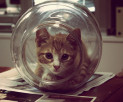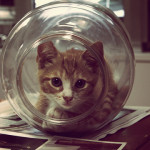You watch cat videos no matter what
Your deadline is tomorrow, and you are determined to concentrate. Yet within ten minutes, you find yourself watching cat videos on your computer. Not only is your work slower, but the end result is worse, too. Next week, Ioanna Katidioti will receive her doctoral degree for her research in which she studied why we allow ourselves to be distracted time and again.
Half the time that we get distracted from work, it is our own fault. We are the ones who decide to disrupt our work. This has to do with the ‘available cognitive tools’ – a bit of brain capacity, so to speak.
Katidioti explains that we are able to use our brains for different things, for example looking at something, solving a problem or listening. But this cognitive tool can only handle one thing at a time. That is why you can only watch one video at a time, and focus on one sound. We can, however, combine activities. Katidioti: ‘For instance, we have no trouble driving and listening to the radio at the same time.’
Cat videos
Katidioti wanted to know if these available cognitive tools determine whether or not we get distracted. Will a video in the background distract you if your visual system is already engaged? To find out, she conducted an experiment with cat videos. She made test subjects look for the differences between two pictures while she played a cat video in the background. She then repeated the experiment, except this time the test subjects had to play a game of Memory.
During that game, the test subjects looked at the cat video more often. Because their visual systems were not previously engaged, they were more easily distracted by the video.
Bubble shooter
She also found that distracting ourselves is a bigger threat to our productivity than external distractions. That means it is worse when we start playing Bubbleshooter than when a co-worker comes over with a question. ‘We didn’t expect that’, says Katidioti. That is because in addition to the time we spend watching the video, we also need time to think about the fact that we want to see it. When your co-worker comes over with a question, you do not have to think about it – it just happens.
Is there any way we can prevent ourselves from getting distracted? Katidioti has disappointing news: ‘You might think you’re in control of your own disruptions, but when your visual system is not engaged and a visual distraction presents itself, you will be distracted.’
Deadline
But there are ways to limit the negative effects. First of all, you can improve the environment you study or work in. Katidioti: ‘Avoid distractions at work that do not use the same cognitive tools as your activities. When you’re writing a thesis, you’re using your visual system. You are then easily distracted by people talking around you. Put on music you like – this will engage your listening system.’
You can also use a disruption system to turn disrupting yourself into an external disruption. Free programmes such as Flowkeeper and Focus Booster can help with this. They will send you a signal to take a break approximately every 20 minutes. This will greatly decrease the chance of getting distracted in the meantime, helping you make your deadline tomorrow.






